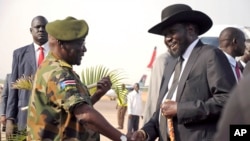The United Nations Security Council has adopted a U.S.-drafted resolution to impose an arms embargo on South Sudan until May 2019.
The resolution includes a travel ban and an asset freeze on South Sudanese military officials Malek Reuben Riak and Paul Malong Awan, both of whom are listed as threatening the peace in South Sudan or expanding or extending the country's ongoing conflict.
The resolution passed Friday with nine yes votes and six abstentions, including Ethiopia, Russia and China.
South Sudan’s ambassador to the U.N., Akuei Bona Malwal, urged Council members to vote against the measure, saying it would deter progress toward peace made by the East African bloc IGAD.
“To pass a resolution at the time when the peace process is making advances, positive advances and you pass such a resolution which will actually not tilt the balance for those parties that are negotiating," he said. "The opposition will think that the Security Council is on their side, so why should they really continue to negotiate peace?”
IGAD has led high-level talks to revitalize a 2015 peace deal which collapsed a year later. The South Sudanese government and rebel groups remain at odds despite rounds of talks in Ethiopia and Uganda.
The South Sudanese ambassador called the resolution a “slap in the face” to IGAD member states and the African Union that are trying to mediate a peace deal.
Karel van Oosterom, representative of the Netherlands on the Security Council, praised today’s vote.
“Today this Council gives a clear signal that the international community no longer tolerates the gross human rights violations in South Sudan and it underscores the need to achieve tangible results in the ongoing political negotiations. The Security Council will continue to monitor the situation in South Sudan and stands ready to act further if necessary.”
Casie Copeland, senior researcher at the International Crisis Group, says the move is significant, although its actual impact on South Sudan's civil war remains to be seen.
"It depends on whether it is enforced and monitored whether it actually stops the flows of weapons in and then what the effect of that is," she told VOA's South Sudan in Focus. "Certainly the country is awash in weapons already so whether it changes the nature of the conflict overnight I think isn’t something that we should necessarily expect to see.”
South Sudan gained independence from neighboring Sudan in 2011, but in late 2013 erupted into violence over a power struggle between President Salva Kiir and his former deputy, Riek Machar.




